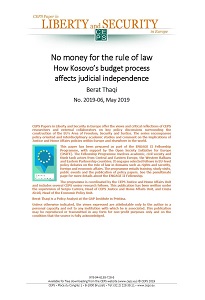TEN YEARS AFTER EULEX. Key principles for future EU flagship initiatives on the rule of law
TEN YEARS AFTER EULEX. Key principles for future EU flagship initiatives on the rule of law
Author(s): Naim Rashiti
Subject(s): Law, Constitution, Jurisprudence, EU-Approach / EU-Accession / EU-Development, EU-Legislation
Published by: CEPS Centre for European Policy Studies
Keywords: Kosovo legal system; EULEX;
Summary/Abstract: With its “credible enlargement perspective for and enhanced EU enlargement with the Western Balkans”, the EU plans to launch several new flagship initiatives for the six aspiring countries. The key initiative envisaged is “to strengthen rule of law” through more detailed assessment of the rule of law and reform implementation by including case-based peer reviews, trial monitoring of serious corruption cases and organised crime, developing indicators for reform implementation and deploying advisory missions. // The EU has begun some planning but detailed action plans are yet to come. New programmes and initiatives should be new in content and form. In the case of Kosovo, things are more complex; the clarity of the new plan and drawing the line between the past and future is key for any success of the upcoming initiatives. With EULEX still on the ground, after 10 years of deployment, plagued by low trust and an image of failure, the rule of law has little improved in Kosovo. The EU should carefully consider the conditions upon which new initiatives are established. // Equally, local authorities need to be fully in the driving seat. Reluctant to do so until now, the government has recently initiated a Functional Review of the Rule of Law Sector and Justice 2020. Their agendas have not progressed much in the absence of political will, and undefined roles and agendas remain between the local authorities and EU. Any new initiatives should be launched based on certain principles that ensure they have full local ownership, are driven by local demand, are based on in-depth evaluation and verification, build upon broad consultations and inclusion, have a clearly defined role and scope, have realistic expectations and contribute to streamlining the reform agendas.
Series: CEPS Papers in LIBERTY and SECURITY in Europe
- Print-ISBN-13: 978-94-6138-729-5
- Page Count: 26
- Publication Year: 2019
- Language: English
- eBook-PDF

